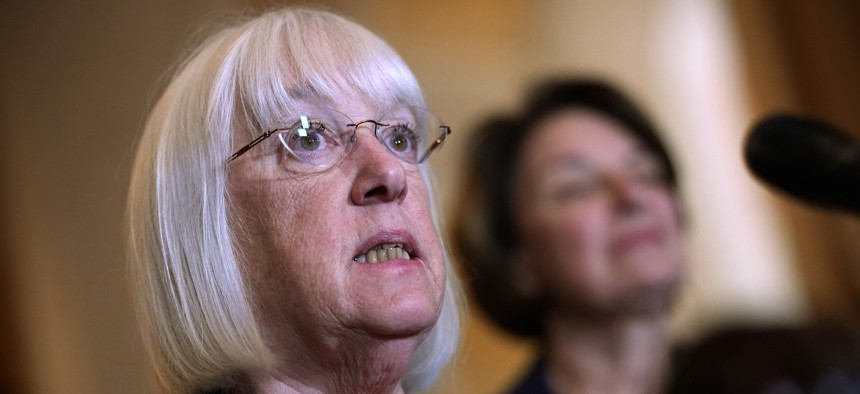
Sen. Patty Murray, D-Wash., at a Sept. 3, 2025 Capitol press conference during which she said that Senate Democrats would not support a partisan continuing resolution to avoid a government shutdown. Kevin Dietsch / Getty Images
Some funding frozen by Trump could soon expire due to new fiscal year, Democrats warn
Congress will need to reach a bipartisan consensus by Sept. 30 to avoid a government shutdown.
Updated at 11:40 a.m. ET Sept. 9
President Donald Trump’s administration has frozen or canceled at least $410 billion in federal funding, according to congressional Appropriations Committee Democrats who warned that some of that money will expire when the fiscal year ends on Sept. 30.
Sen. Patty Murray, D-Wash., vice chair of the Senate Appropriations Committee, and Rep. Rosa DeLauro, D-Conn., the ranking member of the counterpart House panel, in a Monday statement accused Trump and Office of Management and Budget Director Russ Vought of contravening Congress by slow-walking the spending.
“Republicans have total control in Washington — and total control of whether Americans will receive the funding they are promised,” the duo said. “Trump and Vought need to stop blocking these investments, and Republicans need to join us in insisting that every last dollar flows — particularly the billions of dollars in funding that will otherwise expire at month’s end.”
According to the committee Democrats, some of the frozen or terminated federal funding includes:
- $96.7 billion in Federal Emergency Management Agency disaster response grants for states and local communities has been withheld for months.
- $8.9 billion in National Institutes of Health grants “supporting research into Alzheimer’s disease, women’s health, cancer, diabetes and much more” has been canceled.
- $33 million in National Oceanic and Atmospheric Administration funding for coastal resilience and habitat restoration projects has been frozen. While the recipients of such funding have been announced, the money will expire at the end of the month if it is not disbursed.
Democratic appropriators have been tracking spending blocked by the Trump administration since April when they reported at least $430 billion in affected funding. In their first update in June, they said the president had paused or canceled more than $425 billion.
OMB called congressional Democrats’ findings inaccurate.
“This fake tracker, that Democrats dust off every few months to play pretend with, has no basis in reality,” said OMB Communications Director Rachel K. Cauley in a statement to Government Executive.
The GOP will need Democrats in order to overcome the 60-vote filibuster procedural threshold in the Senate to avert a government shutdown that will otherwise begin on Oct. 1.
Out of 12 fiscal 2026 spending measures, senators have already passed the three that cover Military Construction-Veterans Affairs, Agriculture and the Legislative Branch. Murray said during a Sept. 3 press conference that she would vote for a House-Senate agreement covering the three bills, paired with a short-term continuing resolution that maintains current funding levels across the remaining nine appropriations bills, giving lawmakers more time to negotiate without any shutdown.
She warned Republicans in the House, where they have a majority, that Senate Democrats would not support a partisan continuing resolution.
The Trump administration has sought to eliminate funding for programs over policy differences.
The president in July enacted a bill to rescind $9 billion in congressionally-approved funding for foreign assistance and public media.
On Aug. 28, Trump submitted a request for Congress to claw back $4.9 billion for the largely defunct U.S. Agency for International Development. Because the administration can put such funding on hold for 45 days after sending the request, and due to the requirement that agencies generally have to spend their appropriations by Sept. 30, Trump effectively unilaterally canceled the funding. Such a move — which hasn’t occurred in about 50 years, and has been called illegal by the Government Accountability Office and members of both parties — amounts to a “pocket rescission.”
Since the start of Trump’s second term, GAO has determined that there have been five instances of impoundments — when the executive branch delays or withholds congressionally approved funding. GAO, which adjudicates the lawfulness of impoundments, in May had about 50 open impoundment investigations. Vought testified in June that the administration is undergoing a “programmatic review” of federal funding and that it’s “improper” to call the spending pauses impoundments.
Correction: This story has been updated with the correct number of GAO determinations of impoundments since the start of Trump's second term.
Share your news tips with us: Sean Michael Newhouse: snewhouse@govexec.com, Signal: seanthenewsboy.45
NEXT STORY: FEMA begins security overhauls following cyber incident and employee firings







